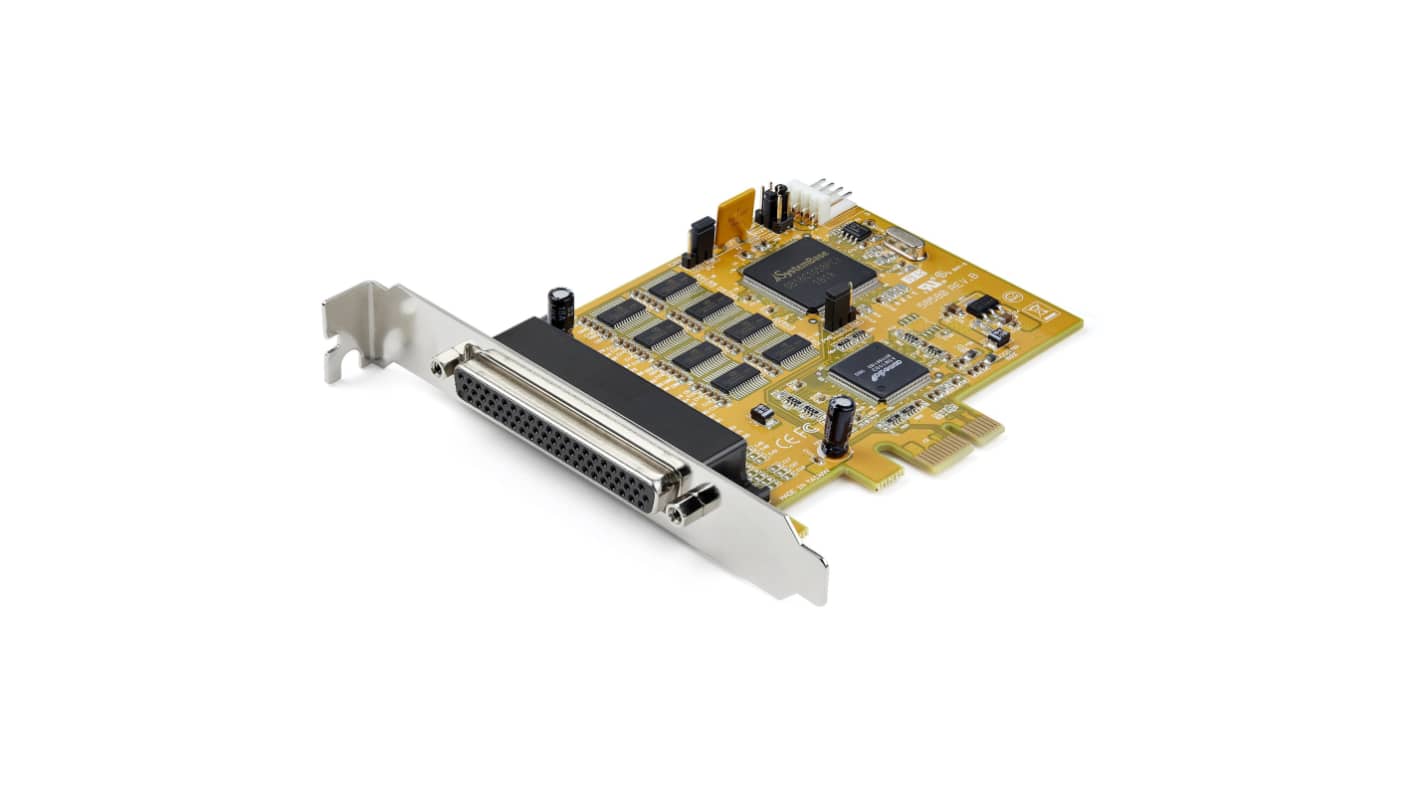StarTech.com 8 Port PCIe RS232 Serial Board
- RS Stock No.:
- 230-5588
- Distrelec Article No.:
- 302-31-452
- Mfr. Part No.:
- PEX8S1050
- Manufacturer:
- StarTech.com

Bulk discount available
Subtotal (1 unit)*
SGD343.13
(exc. GST)
SGD374.01
(inc. GST)
FREE delivery for orders over $150, or create a business account to enjoy free delivery from just $28
In Stock
- Plus 4 unit(s) shipping from 23 February 2026
Need more? Click ‘Check delivery dates’ to find extra stock and lead times.
Units | Per unit |
|---|---|
| 1 - 4 | SGD343.13 |
| 5 + | SGD332.84 |
*price indicative
- RS Stock No.:
- 230-5588
- Distrelec Article No.:
- 302-31-452
- Mfr. Part No.:
- PEX8S1050
- Manufacturer:
- StarTech.com
Specifications
Technical data sheets
Legislation and Compliance
Product Details
Find similar products by selecting one or more attributes.
Select all | Attribute | Value |
|---|---|---|
| Brand | StarTech.com | |
| Bus Type | PCIe | |
| Product Type | Serial Board | |
| Communication Interface | Serial | |
| Number of Ports | 8 | |
| Operating System | Mac, Linux, Windows Vista/XP/7/8/10 | |
| Maximum Baud Rate | 921.6kbps | |
| Connection Port | RS232 | |
| FIFO Size | 2048bit | |
| Standards/Approvals | RoHS, FCC, CE | |
| Select all | ||
|---|---|---|
Brand StarTech.com | ||
Bus Type PCIe | ||
Product Type Serial Board | ||
Communication Interface Serial | ||
Number of Ports 8 | ||
Operating System Mac, Linux, Windows Vista/XP/7/8/10 | ||
Maximum Baud Rate 921.6kbps | ||
Connection Port RS232 | ||
FIFO Size 2048bit | ||
Standards/Approvals RoHS, FCC, CE | ||
- COO (Country of Origin):
- TW
StarTech.com PCIe Serial Board, 8 Ports, 921.4kbps Baud Rate - PEX8S1050
Use this robust adapter from StarTech.com to add eight RS232 (recommended standard) ports to your computer through your PCIe (peripheral component interconnect express) slot. It provides you with multiple DB9 (D-subminiature) ports to connect with different serial devices from a single channel. You'll find it used for CNC (computer numerical control) machinery in manufacturing industries, as well as in point of sale terminals at supermarkets.
Solid constructionMade of durable and corrosion-resistant steel for reliable long-term performance.
Electrical safety
Thanks to integrated 15kV ESD (electrostatic discharge) protection, the adapter is shielded from static electricity, making it practical for use in volatile areas.
Speedy data transmissionSupports quick data transmission rates of up to 921.4Kbps (kilobytes per second) for speedy and effective serial communication between devices.
• MTBF (mean time between failures) of 160,013 hours for a long service life• Cable length of 48cm for easy access to compatible devices without excess cable loops
The StarTech.com 8 port PCI Express RS232 serial adapter card with 8-port breakout cable, provides you with multiple ports to connect a wide variety of serial peripherals, at speeds of up to 921.4Kbps. It has 16C1050 UART based on the system base SB16C1058PCI. The PCI express serial port card makes it easy to add serial ports to connect your peripherals including printers, scanners, credit/debit card readers, PIN pads and modems, industrial controls and more. The 8 port PCIe serial card includes a breakout cable - with 8 DB9 connectors. With broad OS support, including for Windows and Linux, this PCI Express card is easy to integrate into mixed environments. It has 15kV ESD protection.
FAQs
This PCI-e 1x card and fully compliant with PCI express base specifications
It has optional configurable power
It has versatile applications
What's a FIFO buffer?This adapter features a FIFO (first-in-first-out) buffer, which forces data to be transmitted out in the order that it was received. This enhances link efficiency and prevents data loss.
Related links
- StarTech.com 8 Port PCIe RS232 Serial Card
- StarTech.com 2 Port PCIe RS232 Serial Board
- Brainboxes 8 Port PCIe RS232 Serial Card
- Exsys 8 Port PCIe RS232 Serial Card
- StarTech.com 4 Port PCIe RS232 Serial Card
- StarTech.com 16 Port PCIe RS232 Serial Card
- StarTech.com 2 Port PCIe RS232 Serial Card
- Exsys 8 Port PCIe RS232 RS485 Serial Card

